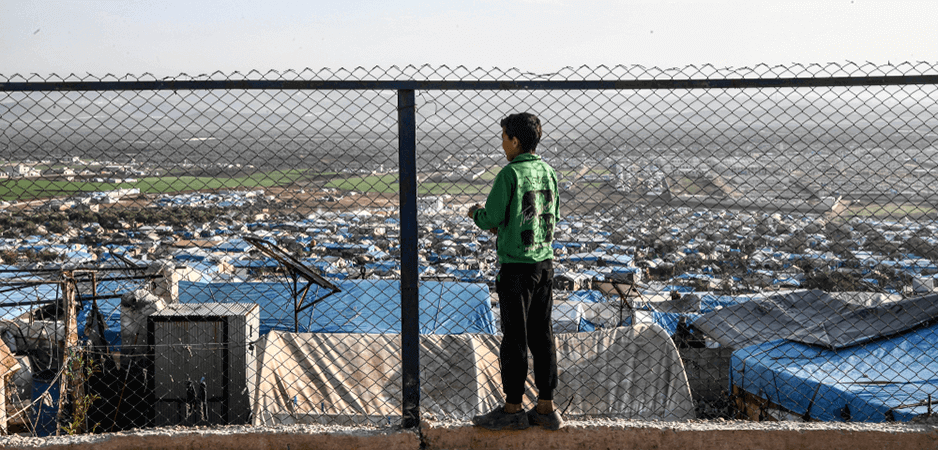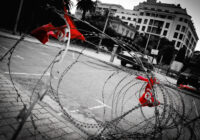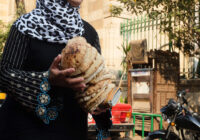The final rebel-held province brings into focus all the pressures on Turkey in the Syrian Civil War.
“Protection comes firstly from God, and after that it’s up to the Turks,” Mohammad al-Youssef, a 33-year-old resident of the village of al-Surman, southeast of Idlib city, Syria, was quoted as saying by Reuters in August.
Turkish troops are in his village as part of an observation post set up through the Astana process by Turkey, Russia and Iran. The deal established de-escalation zones — particularly around Idlib province, where there are 12 Turkish observation posts — in which the parties would act essentially as peacekeepers.
Given the dynamics of a civil war in which Russia, Iran and the Syrian regime are very much on the offensive, this means that in practice, the only side really offering peacekeeping protection is Turkey. That is because Turkey is keen to protect what is left of a rebellion that Ankara has long supported.
More than the US, more than any other outside power, Turkey finds itself in the unusual position of being viewed as the protector by a foreign people: Syrian Arabs. The Turkish flag is flying in these villages, in the hope that it might deter the Syrian regime.
Russian realpolitik
When Turkish President Recep Tayyip Erdogan met Russian President Vladimir Putin in Sochi on September 17, it was their second summit this month — yet tellingly, the Iranians were absent for this second meeting. The result — an agreement on a buffer zone in Idlib, a postponement of a planned offensive in the province, and a commitment from Turkey to deal with jihadist elements in the region — reveals Russia’s deeper regional calculations.
Step back from the heat of battle, and what is revealed? If the Syrian regime led by Bashar al-Assad regains control of Idlib, it essentially regains control over most of the state. That leaves Assad less beholden to Russia for military support, and potentially less malleable. With a large chunk of territory out of his hands, it’s different.
By getting an agreement from President Erdogan to eliminate jihadist factions in the province, President Putin achieves a war aim without the dirty work, keeps the Assad regime guessing, and cements the Russian working relationship with Turkey, thus disrupting the NATO alliance. For all these reasons, Putin will have felt inclined to offer this agreement to Turkey, despite having rejected a ceasefire in a Tehran summit with Iranian President Hassan Rouhani just over a week ago.
An Idlib offensive would be the most sensitive and serious in Turkish policy terms since the fall of eastern Aleppo. The Syrian regime has since concentrated its energies elsewhere, and in that time Turkey’s presence has grown. Turkish troops and allied Syrian rebel forces now actively control a swathe of territory north and east of Idlib province, as well as moving into Idlib under the de-escalation agreement.
Beyond the usefulness of holding Syrian territory as a “facts-on-the-ground” bargaining chip in the civil war and as a buffer against incursions into Turkish territory, what are some of the other motivators behind Turkish interests in Idlib?
Protecting fellow Turks
In a familiar echo of a favorite foreign policy tactic of Putin, Turkey’s interest in the Idlib region is not simply about containing Syria and holding it at arms length. There is also an ethnic dimension. Just as Putin has invoked the protection of ethnic Russians as a reason to involve Russian forces in Ukraine and Georgia, so too has Erdogan invoked the protection of ethnic Turkmen in northern Syria as a need to militarily involve Turkey in the province.
This war is far closer to home for Turkey than it is for either Russia or Iran. Syria borders Turkey, and in the case of the Syrian Turkmen, Turks have ethnic kin within Syria who have a long history of persecution at the hands of the Syrian regime. With the onset of the Syrian uprising in 2011, Turkmen took up arms in support of the opposition. They formed the Syrian Turkmen Brigades to defend the ethnic Turkmen villages of north Syria, which have come under sustained attack from Assad’s ground forces and the Russian air force.
When a Russian jet was shot down in 2015 — prompting a diplomatic row between Turkey and Russia — it was attacking Turkmen positions, and it was ethnic Turkmen who shot and killed the pilot as he parachuted down.
Up to 300,000 Turkmen have already been displaced from their villages in northern Latakia province by the Syrian regime, and Turkey can reasonably argue that without Turkish support, they are at the mercy of a central government intent on exacting revenge against the population at large.
China and the Uighurs
Another complication is ethnic Uighurs from China’s Xinjiang province. The Uighur are a Turkic people who are the majority in the vast western province of China, where they are currently experiencing mass repression by the Chinese.
Istanbul is the headquarters of the East Turkistan Education and Solidarity Association (ETESA), a Uighur organization with links to Uighur fighters in the Turkistan Islamic Party (TIP) and the Islamic Movement of Uzbekistan (IMU). Many of these fighters are based in Idlib province now, since it is the last major territory remaining to Islamist militants in Syria.
Turkey has — for geopolitical reasons — been as cautious as other Muslim states about criticizing Chinese policy in Xinjiang. And yet, ETESA has been very supportive of Turkish war aims in Syria, and an attack on Uighur fighters will only bring the issue further to the surface. Will the Uighur fighters retreat into Turkey, and if so, what will Turkey do with them, and how might China respond?
The threat of more refugees
The Uighur are not the biggest headache for Ankara in terms of migration into Turkey. These less headline-grabbing issues simply add extra pressure to the widely predicted danger of mass refugee flows. An Idlib offensive by the regime in Syria could lead to a wave of as many of 2.5 million displaced people entering Turkey. After all, with this as the last major rebel enclave, there is nowhere else to run.
Turkey already hosts 3.5 million Syrian refugees — the largest number of any country in the world. While Ankara has used the influx as an opportunity, doing both vital humanitarian work and more strategically useful re-education and assimilation work, there is a limit to how many people Turkey can support, especially with a deteriorating economic outlook.
Until now, the Astana trio of Turkey, Russia and Iran have managed to carve out an unlikely alliance to bring a certain stability to the situation in Syria. An offensive in Idlib would threaten that alliance. Turkey is already reinforcing its observation posts in the province. The danger now is that, as the other side pushes toward their logical and stated goal of total victory in the civil war, Turkey’s position within the Astana process becomes untenable.
The views expressed in this article are the author’s own and do not necessarily reflect Fair Observer’s editorial policy.
Support Fair Observer
We rely on your support for our independence, diversity and quality.
For more than 10 years, Fair Observer has been free, fair and independent. No billionaire owns us, no advertisers control us. We are a reader-supported nonprofit. Unlike many other publications, we keep our content free for readers regardless of where they live or whether they can afford to pay. We have no paywalls and no ads.
In the post-truth era of fake news, echo chambers and filter bubbles, we publish a plurality of perspectives from around the world. Anyone can publish with us, but everyone goes through a rigorous editorial process. So, you get fact-checked, well-reasoned content instead of noise.
We publish 2,500+ voices from 90+ countries. We also conduct education and training programs
on subjects ranging from digital media and journalism to writing and critical thinking. This
doesn’t come cheap. Servers, editors, trainers and web developers cost
money.
Please consider supporting us on a regular basis as a recurring donor or a
sustaining member.
Will you support FO’s journalism?
We rely on your support for our independence, diversity and quality.






